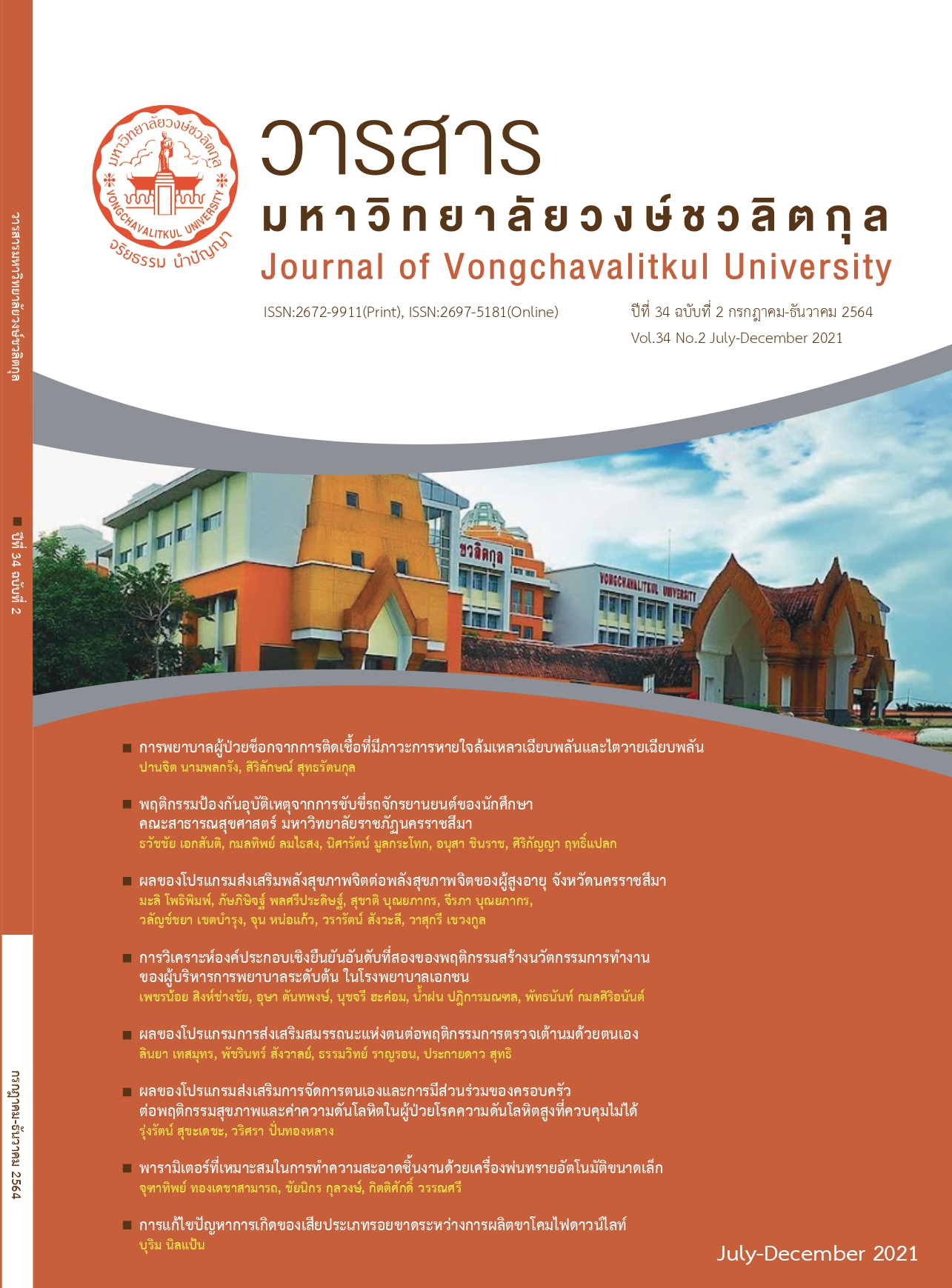Effect of Resilience-Enhancing Program on Resilience Quotient among Older Adults, Nakhon Ratchasima Province
Main Article Content
Abstract
Objective: The purpose of this study was to examine the effects of resilience-enhancing program on resilience quotient among older adults, Nakhon Ratchasima Province.
Method: This study was a quasi-experimental research, two group pretest-posttest design. Samples were 60 older adults, 30 in each group. Thirty participants living in Nong Ra Wiang sub-district, Phimai District, Nakhon Ratchasima Province were assigned into the experimental group; and another 30 older adults living in Nong Phluang sub-district, Chakkarat District, Nakhon Ratchasima Province were assigned into the control group. Older adults in the experimental group received the resilience-enhancing program 8 times, 3 hours each time, once a week. Whereas older adults in the control group received standard care. All research instruments were validated for content validity by professional experts. Data were analyzed using descriptive statistics and t-test.
Results: The results displayed as follows: 1) The mean resilience score of older adults in the experimental group after participating in resilience-enhancing program was significantly higher than the mean score before participating in resilience-enhancing program (Mean difference = 9.43, p <.01). 2) The mean resilience score of older adults in the experimental group after participating in resilience-enhancing program was significantly (p <.05) higher than in the control group receiving normal care (Mean difference = 22.93, p <.001).
Article Details
References
กรมสุขภาพจิต กระทรวงสาธารณสุข. (2564). สถิติผู้สูงอายุฆ่าตัวตาย. [ออนไลน์] จาก https://www.dmh.go.th/news-dmh/view.asp?id=27623
กรรณิกา เรืองเดช ชาวสวนศรีเจริญ, ไพบูลย์ ชาวสวนศรีเจริญ และเสาวลักษณ์ คงสนิท. (2562). ประสิทธิผลของโปรแกรมการเสริมสร้างความแข็งแกร่งในชีวิตของผู้สูงอายุในสถานสงเคราะห์คนชราบ้านศรีตรัง. วารสารพยาบาลกระทรวงสาธารณสุข, 29(1), 32-47.
กุลธิดา กุลประฑีปัญญา และ นิพพาภัทร สินทรัพย์. (2564). การพัฒนารูปแบบการส่งเสริมสุขภาพจิตของผู้สูงอายุในสังคมไทยอีสาน. วารสารวิชาการมหาวิทยาลัยการจัดการและเทคโนโลยีอีสเทิร์น, 18(1); 26-40.
ฉัตรฤดี ภาระญาติ, วารี กังใจ และสิริลักษณ์ โสมานุสรณ์. (2559). ปัจจัยทำนายพลังสุขภาพจิตของผู้สูงอายุ. วารสารคณะพยาบาลศาสตร์ มหาวิทยาลัยบูรพา, 24 (2), 97-106.
ชัชญาภา สมศรี และพิกุลทอง โมคมูล. (2560). ผลของกิจกรรมสร้างสุข 5 มิติ ต่อความสุขของผู้สูงอายุในคลินิกผู้สูงอายุโรงพยาบาลนครพนม. วารสารโรงพยาบาลนครพนม, 3(2), 1-12.
เพ็ญนภา กุลนภาดล และจุฑามาศ แหนจอน. (2558). การศึกษาและพัฒนาภูมิคุ้มกันทางใจวัยสูงอายุ โดยการบูรณาการกระบวนการมีส่วนร่วมของครอบครัวและเครือข่ายประชาสังคม. รายงานการวิจัยฉบับสมบูรณ์. มหาวิทยาลัยบูรพา.
มะลิ โพธิพิมพ์, สุชาติ บุณยภากร, จีรภา บุณยภากร, วลัญช์ชยา เขตบารุง, จุน หน่อแก้ว, วรารัตน์ สังวะลี, และ วาสุกรี เชวงกูล. (2564). ปัจจัยที่มีความสัมพันธ์กับพลังสุขภาพจิตผู้สูงอายุในชุมชนแห่งหนึ่ง จังหวัดนครราชสีมา. วารสารมหาวิทยาลัยวงษ์ชวลิตกุล, 34(1); 22-33.
มะลิวรรณ วงษ์ขันธ์, พัชรินทร์ นินทจันทร์, โสภิณ แสงอ่อน. (2559). ปัจจัยที่มีความสัมพันธ์กับความแข็งแกร่งในชีวิตในวัยรุ่น. วารสารการพยาบาลจิตเวชและสุขภาพจิต, 29(1), 57-75.
มุกข์ดา ผดุงยาม, อัญชลี ช. ดูวอล. (2561). กลยุทธ์การฟื้นฟูพลังสุขภาพจิตในผู้สูงอายุ. วารสารพยาบาลทหารบก, 19(1), 66-73.
ศูนย์ข้อมูลประเทศไทย. (2564). ตำบลหนองระเวียง. [ออนไลน์] เข้าถึงได้จาก http://nakhonratchasima.kapook.com
สุจิตรา สุขทวี, รังสิมันต์ สุนทรไชยา, และอังคณา จิรโรจน์. (2564). ผลของโปรแกรมการระลึกถึงความหลังต่อความเข้มแข็งทางใจในผู้สูงอายุที่มีภาวะซึมเศร้า. วารสารพยาบาลทหารบก, 22(1), 235-243.
อรุโณทัย ปาทาน และ สิริมา มงคลสัมฤทธิ์. (2563). ประสิทธิผลของโปรแกรมสร้างเสริมความรอบรู้ด้านการดูแลสุขภาพจิตผู้สูงอายุของ อาสาสมัครสาธารณสุขประจำหมู่บ้าน เทศบาลเมืองปทุมธานี. วารสารพฤติกรรมศาสตร์เพื่อการพัฒนา, 12(2), 215-232.
Best, J. W. (1977). Research in Education (3rd ed.). New Jersey: Prentice hall Inc.
Gao, Y., Yuan, L., Pan, B., & Wang, L., (2019). Resilience and associated factors among Chinese patients diagnosed with oral cancer. BioMed Central Cancer, 19(1), 447. doi: 10.1186/s12885-019-5679-0.PMID: 31088400; PMCID: PMC6518694.,
Grotberg, E. (1995). A Guide to Promoting Resilience in Children: Strengthening the Human Spirit. Bernard Van Leer Foundation. [Online]. Retrieved on May 10, 2017, From: http://www.bibalex. org/Search4Dev/files/283337/115519.pdf.
Grotberg, E. H. (2003). Resilience for Today: Gaining Strength from Adversity. Greenwood: Praeger Publishers.
House, J. S. (1981). Measure and concepts of social support. In S. E. Cohen, & S. Syme (Eds.), Social support and health (pp. 83-108). Florida: Academic Press.
Laird, K. T., Lavretsky, H., Paholpak, P., Vlasova, R. M., Roman, M., St Cyr, N., & Siddarth, P. (2019). Clinical
correlates of resilience factors in geriatric depression. International Psychogeriatrics, 31(2), 193–202. https://doi.org/10.1017/S1041610217002873
Machin, D. (2009). Sample size tables for clinical studies (2nd ed.). Oxford: Blackwell Science.United Nations, Department of Economic and Social Affairs.
MacLeod, S., Musich, S., Hawkins, K., Alsgaard, K., & Wicker, E. R. (2016). The impact of resilience among
older adults. Geriatric Nursing, 37(4), 266-272.
Maneerat, S., Isaramalai, S., & Jantiya, S. (2018). A Guide to Promote Elderly Resilience: A Perspective from Thai Context. Asian Journal of Humanities and Social Studies, 6(6). https://doi.org/10.24203/ ajhss.v6i6.5655
McClain, Jessica, Katelyn, Gullatt and Caroline, Lee. (2018). Resilience and Protective Factors in Older Adult. Graduate Master's Theses, Capstones, and Culminating Projects. 296. https://doi.org/10.33015/dominican.edu/2018.OT.11
United Nations Department of Economic and Social Affairs, Population Division. (2020). World Population Ageing 2020 Highlights. United Nations. https://www.un.org/development/desa/pd/sites/www.un.org.development.desa.pd/files/undesa_pd-2020_world_population_ageing_highlights.pdf
Wagnild, G. M., & Young, H. M. (1993). Development and psychometric evaluation of the Resilience Scale.
Journal of Nursing Measurement, 1(2), 165–178.
Walker, F. R., Pfingst, K. Carnevali, L., Sgoifo, A., & Nalivaiko, E., (2017). In the search for integrative biomarker
of resilience to psychological stress. Neuroscience and Biobehavioral Reviews, 74(Pt B), 310-320. doi:10.1016/j.neubiorev.2016.05.003
Wells, M. (2010). Resilience in older adults living in rural, Suburban and urban areas. [Online]. Journal of Rural Nursing and Health Care, 10(2), 45-54.
WHO. (2021). Mental health of older adults. [Online]. From: https://www.who.int/news-room/fact-sheets/detail/mental-health-of-older-adults.


